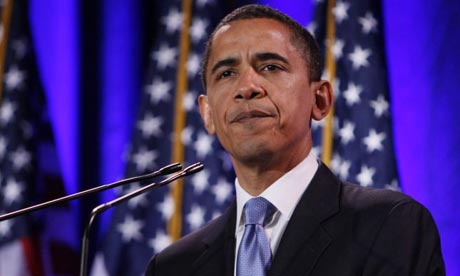Obama refuses to disown controversial pastor

Barack Obama speaks about race during an address in Philadelphia. Photograph: Alex Brandon/AP
Barack Obama took the biggest risk of his presidential campaign so far when he today refused to disown his controversial pastor, Jeremiah Wright, in a potentially make-or-break speech on race.
Obama condemned what he called controversial remarks by Wright about patriotism and race, but, tellingly, he tried to put the pastor's comments into a wider context of race relations in the US.
"I can no more disown him than I can disown the black community," Obama said in his speech in Philadelphia. He portrayed Wright, 66,as a product of his time, brought up under discriminatory race laws and a fighter in the civil rights movement.
But in an extremely personal speech, Obama said that it was time for the US to move on towards a genuinely multi-racial society.
Obama has been on the defensive over the last week as television footage showed Wright, pastor of Obama's church in Chicago until last month, saying 'God damn America' and talking in incendiary terms about how the black community is discriminated against.
Obama is behind in the polls ahead of the primary in Pennsylvania next month. Clinton's team has been battering him over his relationship with Wright.
Obama confronted head-on the questions that have been raised. He said he had condemned, in unequivocal terms, Wright's statements. "For some, nagging questions remain. Did I know him to be an occasionally fierce critic of American domestic and foreign policy? Of course. Did I ever hear him make remarks that could be considered controversial while I sat in church? Yes. Did I strongly disagree with many of his political views? Absolutely – just as I'm sure many of you have heard remarks from your pastors, priests, or rabbis with which you strongly disagreed."
He continued: "But the remarks that have caused this recent firestorm weren't simply controversial. They weren't simply a religious leader's effort to speak out against perceived injustice. Instead, they expressed a profoundly distorted view of this country – a view that sees white racism as endemic."
In spite of that, he would not turn his back on the pastor. "As imperfect as he may be, he has been like family to me." He added: "Some will see this as an attempt to justify or excuse comments that are simply inexcusable. I can assure you it is not."
The crux of the matter, he said, is that "race is an issue that I believe this nation cannot afford to ignore right now. We would be making the same mistake that Reverend Wright made in his offending sermons about America – to simplify and stereotype and amplify the negative to the point that it distorts reality.
"The fact is that the comments that have been made and the issues that have surfaced over the last few weeks reflect the complexities of race in this country that we've never really worked through – a part of our union that we have yet to perfect. And if we walk away now, if we simply retreat into our respective corners, we will never be able to come together and solve challenges like health care, or education, or the need to find good jobs for every American."
The speech was a test of whether Obama, as the Hillary Clinton team, repeatedly alleges, is capable of withstanding pressure when faced with a crisis.
Before the speech, Joe Trippi, a veteran Democratic strategist and former adviser to John Edwards, who pulled out of the race earlier this year, told CBS's Early Show: "It's either going to be the crisis of his candidacy, or a shining moment for him."
Obama's advisers are concerned about the impact on white voters in the Pennsylvania primary, which is to be held next month, and the potential damage that the race issue could inflict in November's general election if he was the Democratic candidate.
America's claims to be a post-racial society have been undermined by the introduction of race into the Democratic campaign and the fracturing of the party vote in primaries in some states, where an overwhelming majority of African-Americans have voted for Obama and a majority of whites for Clinton.
Wright retired last month as pastor of Chicago's Trinity United Church of Christ. He helped bring Obama into the church, presided over his marriage to Michelle and acted as his spiritual adviser.
Constant replays on US television of Wright shouting "God damn America" and railing about discrimination against blacks risk alienating some white voters.
A Rasmussen poll published yesterday said Wright's comments made 56% of the electorate less likely to vote for Obama. The focus on Wright came days after Clinton broke ties with a long-time supporter, Geraldine Ferraro, over her claim that Obama would not have done as well as he has if he had been white.
Obama rarely spoke about race last year as his campaign team tried to present him as a candidate that transcends race. But he has positioned himself as a champion of black rights, an heir to the mantle of the Reverend Martin Luther King, in a speech last year and again in Atlanta in January on Martin Luther King day. He has also criticised those sections of the black community where anti-semitism and anti-homosexuality were rife.
No comments:
Post a Comment